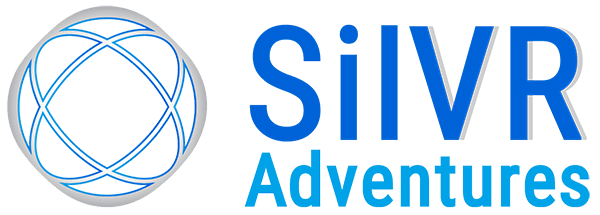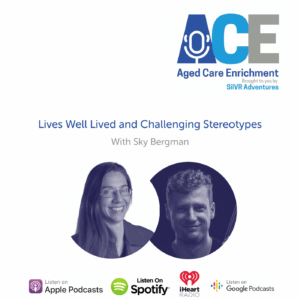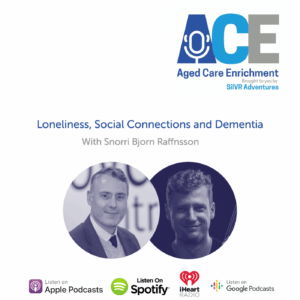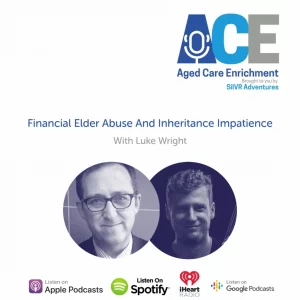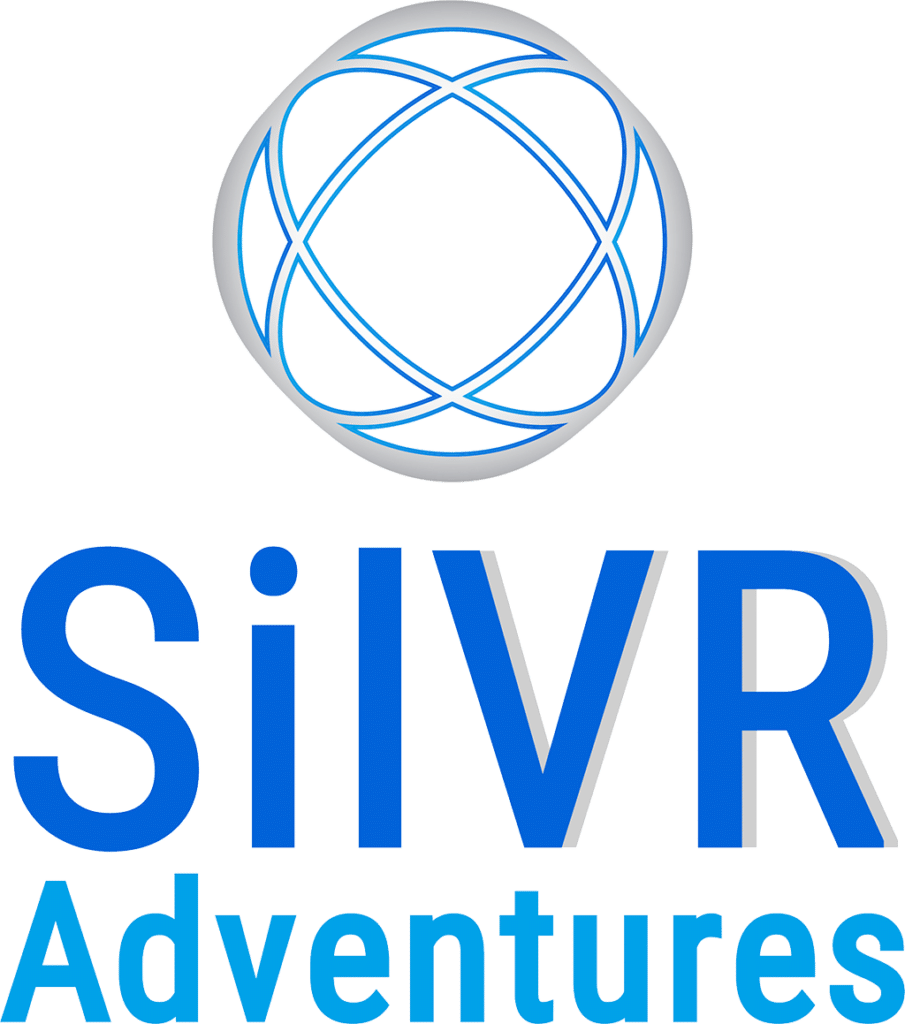Dr. Andrea Maier is a Professor in medicine and healthy ageing at the Vrije University in Amsterdam and a professor for medicine at the University of Melbourne. With a lengthy background in geriatrics and age related diseases her work is now focused on preventing diseases by treating the symptoms of ageing.
As Andrea explains, the body’s ability to fight diseases reduces dramatically with age, so if we can address the physiological changes of ageing we may be able to slow or stop the onset of disease.
Most interestingly, Dr. Maier shares that the use of some treatments has been shown to reduce the biological age of individuals of up to two years!
This is a revolutionary idea that we might be able to change our biological age, and it’s one that Andrea explains clearly in the episode.
With a focus on longevity and healthy ageing, this is a great episode for understanding where medicine in aged care is heading!
Transcript
Ash de Neef: Awesome, well Andrea thank you so much for joining us on the podcast
Andrea Maier: Thank you for having me.
Ash de Neef: It’s a real pleasure.
And can we start with a bit of your background and the work that you do?
Andrea Maier: I’m Andrea Maier. I’m 40 plus I think that’s very important for this topic and I really would like to solve the ageing problem.
I am by training a geriatrician. So working with older individuals, but I’m also a general medicine specialist, so I studied medicine and then specialised looking into diseases. While doing my medical studies also did lots of research into different topics, but especially in the end, the biology of ageing.
So I’m a researcher, I’m a professor at the university of Melbourne, at the Free University in Amsterdam. And since recently, also at the National University in Singapore,
Ash de Neef: Wow you’re spreading yourself thin across three different times zones there.
Andrea Maier: I would say this is sometimes not easy, but it can also be very efficient.
Ash de Neef: Very true. And you said something there about solving the ageing problem. What did you mean by that?
Andrea Maier: So the population we have on earth, so the species we are the homosapiens. We are growing old, which is the success of modern medicine, but also that our environment is very safe and that we have very good hospitals.
So it’s really hard actually to die. There ways as a consequence or as a gift our population is ageing. With the ageing process, there are lots of age related diseases. Think about dementia, hypertension, lung diseases, cancer, so all these diseases happen at older age.
So while our population, we as a society are growing old, we have an ageing problem, which might be… First it was a gift of course, we are growing older.
But the negative part is that we have lots of age-related diseases. So we are not entirely growing old gracefully.
Ash de Neef: So this term of age related diseases, this is implying that age is somehow a factor in the arrival or the onset of these diseases. And you mentioned diabetes and dementia or Alzheimer’s there. How is age related in the onset of these?
Andrea Maier: So if you’re at a certain age, your chance of having a disease is much higher, therefore we call it age-related diseases.
The risk that you will have a disease is increasing significantly from the age of 40 onwards. Giving you a couple of examples, 50% of a 50 year old population has at least two chronic diseases. 60% over 60 year old population at least has two or more chronic diseases.
And at the age of 70 it’s 70%, at the age of 80 it’s 80%. So age is a huge risk factor.
And ageing means that we are using our body, every day, we are using our body. Every minute, every second. Now everybody listening is using the human body because hopefully we are breathing, and we are doing something and we are actively listening. Which means that we are using all our organs, our our muscles. In our brain to actually process what you are hearing at the moment.
And as you all might imagine that if you’re using something that something, so for example the body, will have accumulated a little bit of damage because we are using it. So it’s not new anymore. And while using the body, which we call the ageing process, there ways the body or something you are using is actually at risk to break or to lose function.
And there ways, we call that in the human body a disease.
Ash de Neef: Okay. So something, I imagine is part of the body’s processes is regenerative processes and ways to kind of restore this damage. Is it the case that as we get older, this faculty diminishes?
Andrea Maier: Yes. Partly. So from the first second we are born or even during conception, we are using the human body. And our body is very clever and our cells are very clever because they try to diminish actually the damage. And they try to restore and to make a new sort of cell and a new body and to repair everything.
However this repair is never 100%, so there will always be touches of a little bit of damage. As you see in lots of things you are using you cannot really polish something to make it new again, you can Polish a little bit, but it’s not new.
So there is always a little bit of damage left, and during the ageing process, the processes of repair, we call it, they are also decreased. So older individuals or ageing individuals are less likely to repair all the damage just by using the body in the way younger individuals can do that. And if you cannot repair, then you accumulate the damage, which then can be a sign that there’s nature related disease in the end.
Ash de Neef: Hmm. Something we wanted to talk about today is geroscience. Is there a link here between the body’s natural ageing process and geroscience?
Andrea Maier: Absolutely. Geroscience is a quite hip word or a terminology being introduced around about 10 years ago. From, and it’s coming from the US. Geroscience is a little bit the combination of the understanding of why we age, so the biology of ageing, together with the understanding of accumulation of age-related diseases. So why we grow older with age related diseases.
And it really tries to understand how these mechanisms interfere. So what is happening during the ageing process at the moment, and what’s going wrong, that in the end, that damage is showing up as a disease?
And also the aim of geroscience is of course, to prevent this, to prevent age related diseases. So the occurrence of dementia, of cancer, of lung diseases of osteoarthritis, of osteoporosis of sarcopenia, all the diseases we know of.
Ash de Neef: So with what is, causing ageing, then. When this question is posed to me, or I think about what that could mean, it frames ageing as an optional element of life. Am I hearing that incorrectly?
Andrea Maier: No, that’s absolutely correct. So if you want to treat something, if you want to prevent something, first of all you need to understand why something occurs. And while increasing the knowledge, why ageing occurs, we first have to understand it.
So now in the last 20 years, we understood at least partly why we age and while having that understanding of course, it gives us the opportunity to interfere. Which means that we are interfering with ageing, and to be able to interfere with ageing, we need to define ageing as a disease.
Because I’m a medical doctor. I am used to treating diseases. So I need a disease to prescribe, for example, interventions by giving medication, or by asking a surgeon to fix something.
So ageing is since 2018, it’s recognised as a disease. We have the international classification of disease registration, where now ageing is part of that. And since 2018 it’s recognised that the age-related changes in the human body, they can lead to age related diseases and we are allowed to treat them.
So coming back to your question, you were saying that ageing should be or could be treatable. Yes, we are treating ageing or the process what’s occurring during time, we are treating that as a disease. And trying for example, with medication or some sort of lifestyle changes to reverse it.
Ash de Neef: To ask a kind of dumb question about interfering in maybe the natural order of things here, it feels a bit odd to come from an outsider’s perspective and think isn’t that just what bodies do or…?
Andrea Maier: Sure but this is what medicine is doing, we are interfering with physiology or a part of physiology. So everything that’s in the making or what is not good in the making of our human body. If we have, for example, somebody who has diabetes and receives medication, we are interfering with so much in the human body.
So medicine is really built on interference with cells in our human body and we always do that. What we are doing in geroscience we do it a little bit earlier. We don’t wait until there is a disease, an age-related disease we would treat in the hospital or at the GP clinic. But we try to actually avoid that stage, and interfere much, much earlier at the age of 30 to 40.
And maybe even earlier,
Ash de Neef: Wow. So we’ve got this earlier intervention and we’re improving the quality of life and extending the lifespan. What exactly is the kind of end goal here?
Andrea Maier: The end goal is the health span. So you just mentioned the lifespan. So the lifespan is the years, the number of years on earth, so how old you are going be. The health span is the period with good health.
And we are defining that as the number of years you have without age-related diseases. So that’s health span. So the aim of geroscience is not per se, increasing the lifespan, so how long you are on earth. But increasing the health span, so how long you are on earth without age-related diseases.
There is one side effect. If you have a long health span, so if you are long on earth without age-related diseases, then the side effect is, and you can say if it’s a positive or a negative side effect, that you are very likely also to live longer. So the health spin will interfere very likely with the lifespan.
So because you need something to die of and it can either be an accident, and that’s absolutely not related to age related diseases, but most of the time you die because of related diseases. Because your body is not a good enough anymore to fight them. And that’s the reason, most of the times for death. You die of cancer, you can die of COPD you will die with dementia. You will die because of lots of age-related diseases and the body is giving up.
So if we are increasing the health span, so the period in health, then we will extend the life span. But it’s not the aim, and especially not my aim to have an even greater number of individuals on earth with lots of age-related diseases, because that doesn’t make sense at all.
Ash de Neef: So I guess one side effect of extending the health span would be reducing the time that somebody needs intensive or high levels of care. Would you say that it’s the ideal situation that we live a full and healthy life right up until several weeks before dying?
Andrea Maier: I would say that that would be ideal if you actually know when that time comes. Because to be very honest, sometimes it’s also a very important time in life, the last phase to actually to say goodbye to others.
So if we can predict when we are going to die and then having that fast, significant deterioration of our body, that economically would be wonderful. But I think that you have to know when to actually to say goodbye to others.
But that’s what animal researchers really see very frequently, that for example, mice which are treated with anti-ageing agents or medications that they are living quite functionally well until the last day. And then they are found in the cage being dead. So it seems that there is a rapid decline in function, and that is actually possible.
And of course, if you look from an economic and societal perspective, that would, of course be quite ideal. So reducing the number of individuals in residential aged care facilities and the periods of time, they need help.
Because every human being, of most of them, they want to live independently at home. That’s most of the time the wish of human beings. To be surrounded by your own stuff, to be surrounded by things you like and being independent and that’s very important.
Ash de Neef: Hmm. Okay. So it sounds like there will be, all things considered if geroscience achieves its aims, there’ll be some sort of balance between what’s efficient and what allows for a really healthy exit to life.
Andrea Maier: A healthy exit to life. I love that one.
Ash de Neef: That’s the name of my first book.
Andrea Maier: Wow.
Ash de Neef: Awesome. So something else you’ve been doing under is re-purposing medications. You’ve been doing some research into the use of different medications for treating dementia. Can you tell us a bit about that?
Andrea Maier: So we have a huge amount of medications present at the moment. Think about medication you take for diabetes or for high blood pressure or for different diseases, even psychiatric diseases.
And we learned so much in the last 50 years about medications. How they act, what kind of side effects they have. We give them to a huge amount of individuals and we know how they work and they’re quite cheap, most of the medications we already have.
That we thought in the geroscience field, “Hey there’s so much knowledge and we know what these medications do, couldn’t we repurpose these medications to also give them not to diseased individuals, but to ageing individuals?” Because some of the medications they interfere with the human body in a way that could be quite helpful for either repair or maintenance of cellular actions.
So the entire field is now really investing on the repurposing of drugs to actually see, in trials with human beings, what that would look like. If we can actually give them, of course we can give them to healthy individuals, but if they then are biologically younger in the end. And thereby in the longer term, they will not have age-related diseases like cancer, cardiovascular disease et cetera.
So we did lots of research to actually see what kind of medications could be useful to repurpose, which are quite cheap, but also with not many sides effects. And we especially looked in the field of dementia because dementia is occurring in 25% of 80 year olds, and we don’t have a treatment yet for dementia.
So we really summarise and also doing trials now here in Singapore to see what other candidates, we could use. And we found a couple of candidates actually, which are quite positive if we are looking at animal studies and which have some positive signs already in human studies.
Ash de Neef: Hm. So can you give us some examples without going too deep into the technical specifics?
Andrea Maier: I will give the example again of Diabetes. So if you have a high blood sugar level, lots of individuals get then Metformin. Metformin is a medication to actually lower the glucose blood level, and to also keep the cells a little bit healthy while having a higher glucose levels.
So the idea is if we would give that medication, to younger individuals to already make their ageing cells a little bit smoother to react on fruit intake, for example, then you would prevent all the damage while eating at earlier stages already at the age of 30 – 70 or 80, it doesn’t really matter.
So that’s one of the examples being tested in a very big study by a colleague of mine [???] in US. He is including thousands of Americans at the age of 60 to actually give Metformin. And we are going to do studies to also look at the mechanisms in much younger individuals at the age, of my age, at the age of 40.
Ash de Neef: Okay. So throughout this whole conversation, we’re talking a lot about preventative medicine and interventions to prevent future complications. This is not normally the way that medicine operates right? This is kind of a shift of focus isn’t it?
Andrea Maier: Yeah, absolutely. Because I am trained as an internal medicine specialist to treat age-related diseases or to treat diseases. If somebody comes in with pneumonia what do I do? Of course I will prescribe antibiotics. If somebody has a high blood pressure, I will prescribe that, and that and that. So what this means is that something occurred already, and I will act. Which is a reaction on something which happened.
So now we really say, we know that we can prevent things to happen and can act earlier.
And in a way, for example, vaccination is a sort prevention. So I think everybody knows what prevention looks like. We all know that physical exercise and a healthy diet, not having a high weight, really prevents lots of age related diseases, and we know it works.
And geroscience also tries bringing lifestyle interventions to the clinical practice also to interfere with the body while giving medication.
Ash de Neef: So if you come with me on an imaginary trip here, and we’re imagining that the geroscience is kind of accomplishing these goals and where we’re treating things earlier and earlier in a preventative sense. Do you imagine that, people who are between the ages of 30 to whenever are starting to take pills and have treatments. throughout the rest of their life to extend the healthy ageing process?
Andrea Maier: Yes, you are right. I think your next question is then “are you really preventative or because ageing is a disease, so we should start earlier and earlier.” But yes, that’s the scenario we are working on that actually you get a shot at an earlier age at the age of 30 to prevent the accumulation of damage.
You repair the damage, which already occurred, and your likelihood will decrease that you have age related diseases in the end. So it will be a lifetime of a life approach to end up not as a patient in a room with me as a classic general medicine doctor.
Ash de Neef: Okay so they’re trying to keep you away basically.
Andrea Maier: Yeah. I’m running out of running out of patients in my waiting room that’s really my aim. But having other approaches, especially in the public health arena or primary care that, we actually tackle the symptoms 30 year olds already have at a much earlier space to grow older without diseases.
Ash de Neef: So a lot of this is in the kind of theoretical or research stage at the moment. Right. Is there anything that’s out of trials, that’s being used with humans to great effect?
Andrea Maier: Yes. Some of these experiments have been proven positive and good in in human trials, but in very small trials, so including just 20 to 40 individuals. Recently there was a study in individuals at the age of 60, these were all males in the US.
And they were treated with a cocktail of four different medications and that cocktail made them two and a half years younger after six months of treatment.
Ash de Neef: What does that mean two and a half years younger?
Andrea Maier: Yes. So they measured it by looking at biomarkers. So we are using biomarkers to actually see if treatments work, because we don’t have the time to wait 10 or 20 years until there’s a disease popping up. That’s a long time.
So we are using markers and they used an ageing clock. Looking at the epigenetic makeup, that’s very complicated. So we have genes and on top of the genes they are levels of sugar and these levels of sugar on top of the genes, they can be altered. And we can judge a little bit how old somebody is.
So it’s a little bit a biological age clock. So in these individuals taking four medications, were actually two and a half years younger compared to when they are started with the cocktail. Which means that, the proof of principle, that at least in human beings, we can reverse ageing and we can measure something.
This doesn’t mean, of course, that these individuals will not have an age related diseases, of course we haven’t haven’t proven that yet. But at least we have the indication of using these markers to show it.
Ash de Neef: Wow. Okay. There’s, there’s lots of, uh, the mind leaps to many different directions here with the ability to measure somebody’s age with biometric markers. It sounds a little bit like counting the rings in a tree.
Andrea Maier: That’s true. The difference with counting the rings in the tree is that the human body is flexible. So normally the tree and the rings they are accumulating whereas if our interventions are successful and we already showed that, we can actually decrease the number of rings again.So therefore we know how old somebody is biologically, because we have now the expertise in measuring the biological age.
So we can now say, “okay, you are 50, but your body is actually behaving as a 40 year old or as a 60 year old.” And that’s your biological age.
And if we, then, if somebody is 50, but biologically 60 and we give lifestyle interventions, for example, we ask somebody to be on a treadmill for three times a week during a couple of months. We can actually show that the biological age will decrease.
So we already know from lifestyle intervention that we have very good markers to actually test that somebody is objectively being younger again.
Ash de Neef: Wow. Okay. I’m sure there’s lots of listeners who will be thinking. Yes, I am 50 years in lifespan, but biologically I’m still 29.
Andrea Maier: It’s important. So next time, ask your GP and say, “Hey, I have heard that podcast, what is my biological age?” And hopefully you will have an answer.
Very important also to the listeners is not only that we can objectively measure the body’s age, so the biological age, but research also shows that we are asking individuals, how old do you feel?
That already gives a very nice association with risk of outcomes you will not want to have like death and diseases, et cetera. So if a group of 60 year olds is being asked, “how old do you feel?” And a group of individuals feels that they are three years younger compared to their passports age so 60. So they feel 57 or younger. They have a 40% decreased likelihood to die compared to the ones who say “yes, I’m 60 and I feel 60.”
So if you are feeling younger, this is associated with something good. So because you have some reflection, I think how you are going and how you are doing and how your body is functioning.
Ash de Neef: Wow. That’s very interesting. I wouldn’t have thought that how you would feel in your own body would have such a strong correlation to how you’re actually going.
Andrea Maier: So people of course shouldn’t know beforehand that there is a huge association because everybody would say “yes, of course I’m 60, but I’m feeling 20.” So without that knowledge, if you ask individuals, it’s a very good predictor of how it’s going later in life.
Ash de Neef: Andrea we’re almost out of time. I wanted to ask you one more question in the US uh, very recently we saw that a new drug has been approved to treat Alzheimer’s and I’m going to try and pronounce it aducanumab, I think that’s how you say it.
Have you heard anything about this? Does this tie into your research at all?
Andrea Maier: Absolutely. And it’s a sort of earthquake in geriatrics and I think around the world, there’s lots of debates of if that drug should have been approved or not.
Look it’s not a new drug, the mechanism has been studied for at least one or two decades now. And that medication tries to remove plaques, which are accumulating in the brain, and we think that this is causing Alzheimer’s disease.
But while removing these plaques and these damages in the brain from Alzheimer’s patients, there is the idea that you will cure the brain disease. However, while giving the medication there is then so much additional damage because of removing and cleaning a little bit the damage in the brain, that this might have lots of side effects.
So personally, I think this is a highly political decision and looking also at the mechanisms of that medication. And additionally, what evidence there is, it will not be prescribed much. And I think that’s good, at least in Europe, I’m not sure about the US, but I don’t think also in Australia much in the next coming years.
Because it was a highly political decision in my opinion, and we just need much more rigorous data to actually prove that it’s going to work.
Ash de Neef: Yeah, for now, it’s interesting to know that it’s not just a case of finding a treatment that addresses symptoms. It’s also finding a treatment that doesn’t contribute to other symptoms or potentially lead to other negative outcomes.
Andrea Maier: A medication always has a sort of working mechanism and if something works most of the time it also has side effects. Of course you are regulating something and then therefor you are interfering with other systems.
And the human body is very complex. These studies really show that inflammation is one of the side effects and inducing even more damage. So I think we just need a little bit more time to sort out if this is the best strategy to cure Alzheimer’s disease.
Ash de Neef: Fantastic and very interesting. Andrea thank you so much for your time. Where can people find out a bit more about your work and your research?
Andrea Maier: Look me up at Twitter, for example, Andrea B Maier or LinkedIn, the same Andrea B Maier. And the regular websites, if you are Googling me you will find hits and all the links. And happy to answer questions if you have any.
Ash de Neef: Perfect. Andrea thank you so much for your time today.
Andrea Maier: Thank you.
